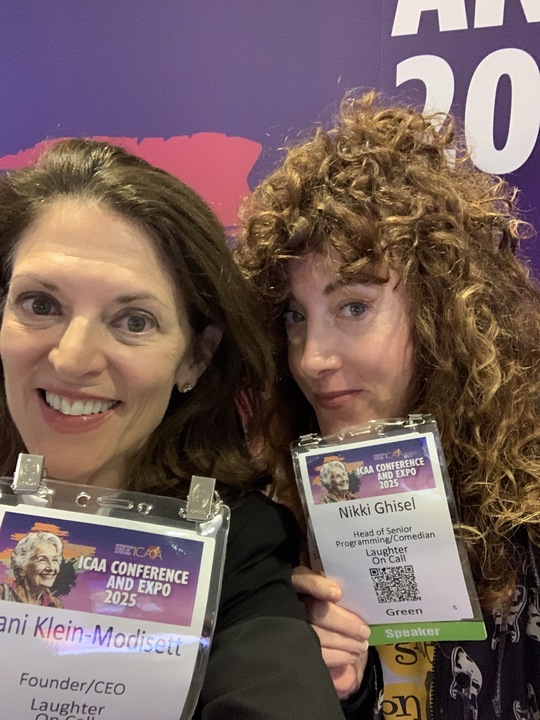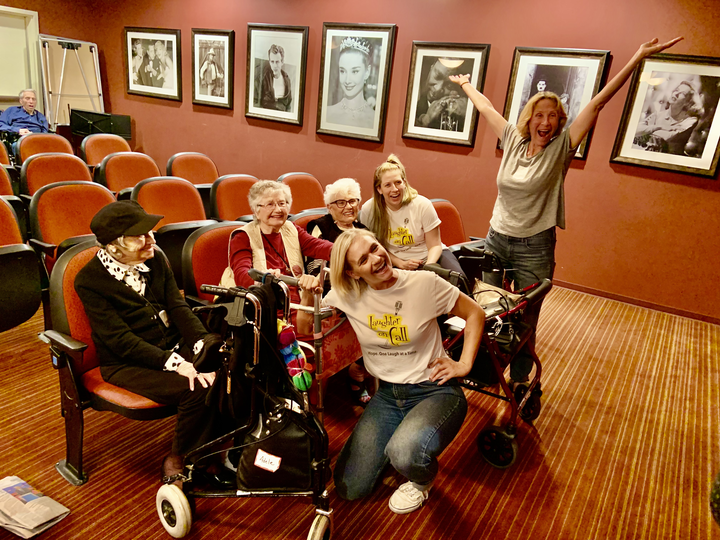
Earlier this week I was invited to speak at the International Conference for Active Aging. Emphasis on active! The fabulous comic/actor Nikki Ghisel and I were here a few years ago but this week we were both struck by the change in focus of the conference. The agenda has clearly shifted from managing the ravages of aging to being proactive, pun intended, in keeping our bodies and minds healthy! When we spoke here last, in Halloween costumes, we recalled lots of other presenters in estate planning, break-through drug research and no-button pajamas.
Walking into the exhibit hall yesterday, we were met with, wait for it…a sea of state of the art gym equipment! Including balance balls, trampolines and a machine that tests your “power” from Keiser. So many people were sporting athleisure wear I had a flash of Jane Fonda popping out in a leotard to lead some jazzercise! Cue the Richard Simmons hologram! Kidding! It’s actually exciting to see the focus in elder care migrate away from legal issues and drug interventions to a more integrative approach for creating healthy minds and bodies.
At lunch, a personable man from the BUCK Institute shared four illuminating discoveries about Super Agers. Buck is a non-profit committed to researching aging and age related disease. Here’s a link to their podcast - chock full of episodes with really good information. In case you’re not familiar with the term Super Ager, Harvard Medical School defines it as “people in their 70s and 80s who have the mental or physical capability of their decades-younger counterparts.” I was all ready to nominate myself for this until they added remembering names and where I parked my car.
The good news is that “super aging” is not some gene you’re born with! There are at least four specific actions we can all do to help us land in this category. And regardless of whether we end up super agers or not, we can definitely positively affect what is now referred to as our “Healthspan.” This is the 21 C. update to the previous focus on “Lifespan.” Healthspan encompasses more than just living longer than all your friends, it also pays attention to quality of life by staying lucid, engaged and active.
Here are the four behaviors of Super Agers that you don’t have to be genetically gifted to do:
- EAT NUTS. Raw ones. And not pulverized. Peanut butter does nothing for you. Whole WALNUTS to be precise!
- EXERCISE - walking counts! There’s something called the 3-3-3 work out that gets very specific about optimizing your fitness.
- REST - the more the better. Used to be 9 hours but now they’re saying up to 11. Sleeping lets the brain recharge. Here’s a link to learning more about it. Researchers found that people who get less than 5 hours of sleep a night are TWICE AS LIKELY to experience dementia. GAH!
- HIGH SOCIAL INTERACTION - Engaging with other people is proven to improve our health. At Laughter On Call this is our whole mission! As experts in this area for seven years, we’ve seen firsthand what engaging with people does for our physical and mental health! So join groups - classes, religious organizations, alumni meetings, knitting, books, etc. NOTE: Super Agers are also notably not people who retire. So if you can keep working, do it. Probably has something to do with the social engagement of working with others!
I have to run now, literally. With a feed bag of walnuts, on the phone with my sister, and doing my taxes for maximum health impact. Look out Super Agers, I’m coming up behind you!




